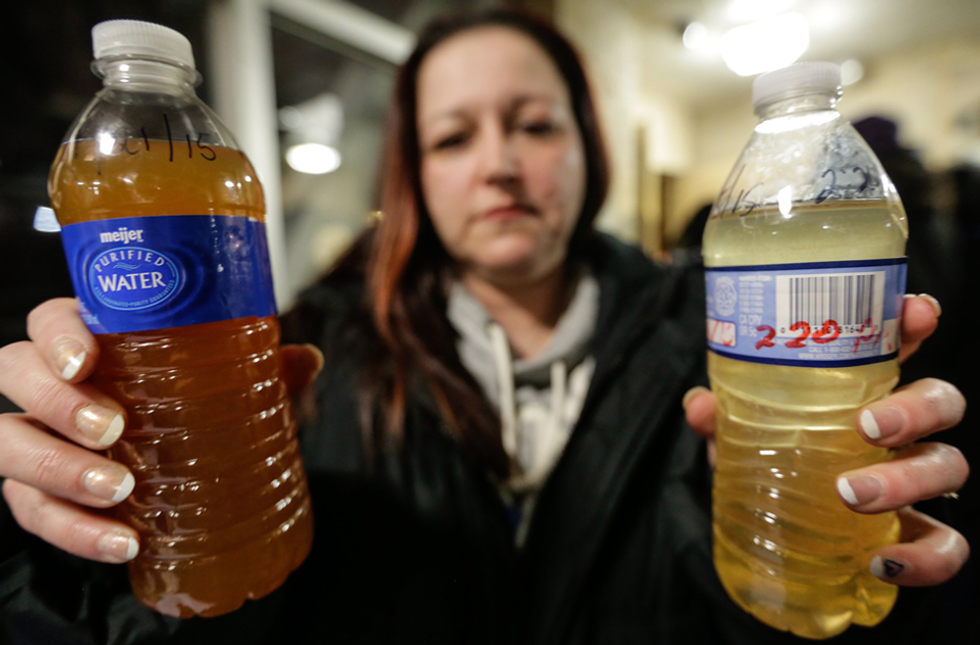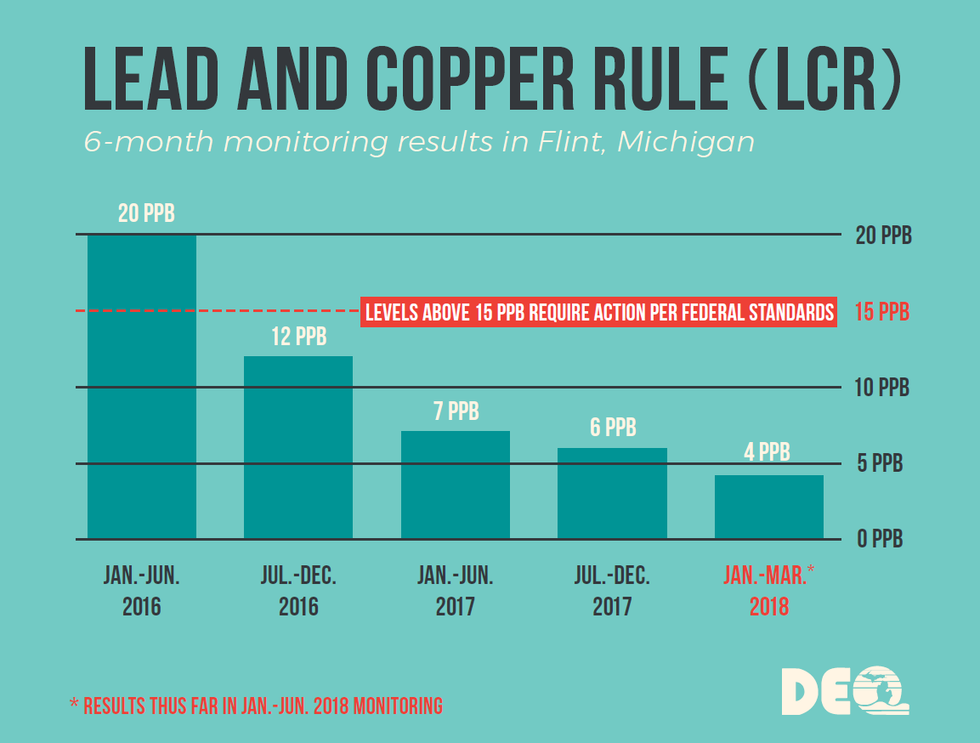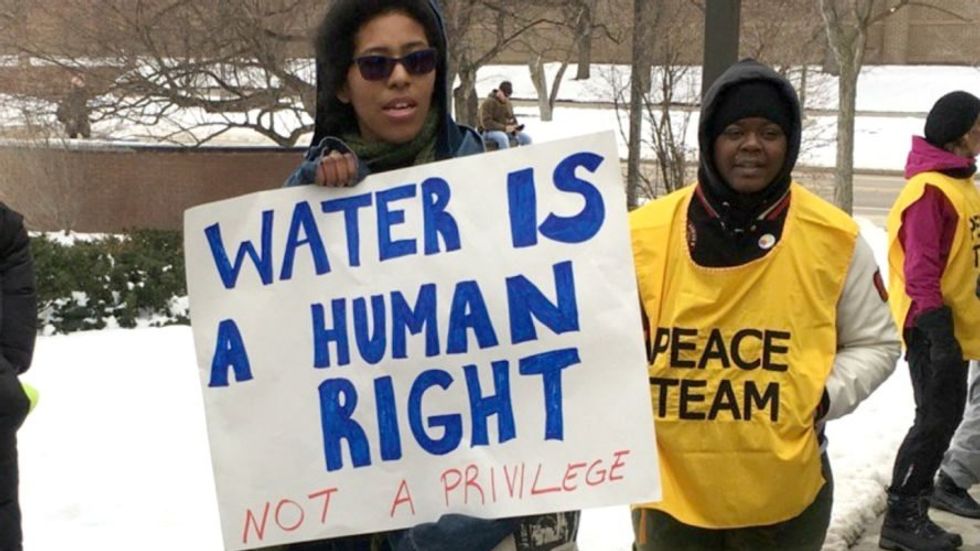The Flint, Michigan water crisis broke national news in 2014 after Michigan state officials switched Flint's water source from Lake Huron (a Detroit river system) to Flint River to save money. Cutting costs turned out to be the only positive consequence of the change.
The new water system lacked proper treatment and inspection for both the actual liquid and the pipes carrying it, leading to the spread of corrosive water throughout the city of Flint. Residents immediately noticed signs of toxicity in their water by the foul smell, look, and taste.
Shortly after, widespread rashes, hair loss, sickness, and even 12 deaths (from a Legionnaires outbreak) catalyzed EPA intervention and scientific experiments to confirm what many feared: lead-traced hazardous water filling the households and buildings of a city already in an economic decline (Chavez).
Testing performed on the water found evidence of over 20 heavy metals, organic compounds, byproducts of chlorine and disinfectants (Goodnough) Flint citizens reporting cases of physical detriments due to contaminations in the city's water led to the EPA enacting a Safe Drinking Water Emergency order, enabling both the state and federal governments to organize and carry out relief efforts like rerouting of the water supply, long overdue maintenance and replacing of abraded water pipes, and the distribution of filters and bottled waters.
Since the outbreak's initial devastation, although strides have certainly been made to improve conditions, Flint residents still fear the use or consumption of the local water, and rightfully so.
However, the federal and state government have a much different perception of the city's state of recovery than the local government. Governor Rick Snyder announced earlier this month that after having, "worked diligently to restore the water quality and the scientific data now proves the water system is stable and the need for bottled water has ended,” (Fontin).
The mayor of Flint, Karen Weaver, responded much differently to this directive, after hearing about the decision right before it went public, saying "We did not cause the man-made water disaster, therefore adequate resources should continue being provided until the problem is fixed and all the lead and galvanized pipes have been replaced," (Fontin).
After two years of testing, observing, and working to improve the water quality in the devastated town, a 6 month monitored study of the PPB (parts per billion) levels of lead and copper in Flint's water proves that the PPB levels have decreased enough (now at 4 from the 20 it began at in January of 2016) to pass the LCR (Lead and Copper Rule).
If a water source demonstrates levels of PPB above 15 it requires federal action, which is why Flint was originally given $100 million in recovery funds and from the federal government as well as $350 million from Michigan taxpayers (Fontin).
While these initial results seem promising, they aren't enough to overcome the fear and skepticism of the thousands who've been affected by the carelessness and lies of those appointed to ensure their safety before. Families have been showering, cooking, cleaning, and surviving with only water shipped in from other locations for four years out of necessity.
Rebuilding trust is a difficult enough task as it is, now, imagine having to rebuild trust with government officials who allowed polluted water into your home, poisoning your loved ones and yourself, while denying the reality of an issue in water quality for months. Imagine having to trust tap water again after years of it being discolored and fetid, not to mention physically dangerous.
Finally, place yourself in the mindset of a Flint resident who hears the government is terminating the distribution of bottled water, despite the fact that the affected pipelines which introduced the noxious metals into the water originally won't finish being replaced until 2020 and that only around 6000 have been replaced thus far, leaving somewhere around 12000 still in need of fixing (Fontin). I'd say the majority would logically be pretty damn hesitant.
While both the local and federal government personnel are to blame for both keeping the affected citizens in the dark about the reality and state of the situation throughout this catastrophe, and also failing to act quickly after initial complaints about the water quality were brought to their attention, at this point in the process, the federal officials are clearly moving towards wrapping up their involvement as soon as possible.
Flint's chief public health adviser, Dr. Pamela Pugh, released a statement of uncertainty after Gov. Snyder's announcement, “We have not received clear steps as to how the remaining lead in Flint schools will be remediated or how ongoing monitoring will continue for our most vulnerable populations," (Fontin). Pugh epitomized the state of Flint's citizens with the use of 'vulnerable'.
These innocent people have had a basic essential to life ripped away from them, and now their only viable and proven-safe source of it is gone as well. It's hard to value the importance of such a common resource in one's everyday life until it's no longer attainable, and the men and women working in Washington cannot genuinely appreciate the sacrifices and suffering the inhabitants of Flint, Michigan have endured without water.
These victims (of something completely out of their control) are not ready to rely on water that still has the potential to contain threatening materials, and the government shouldn't yet take away their only sure-fire method of finding usable water.























